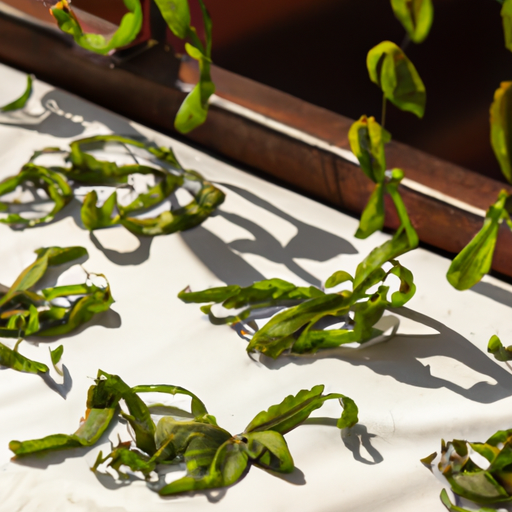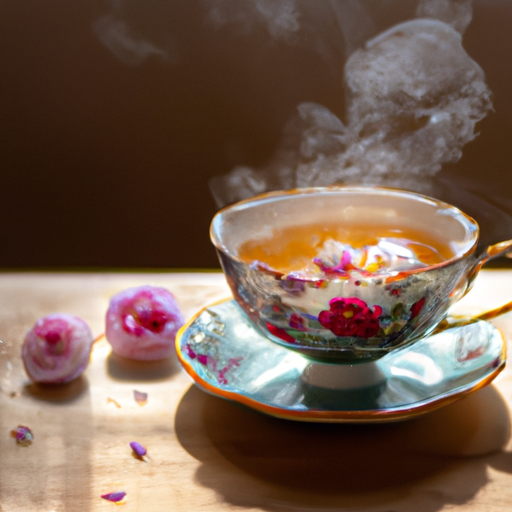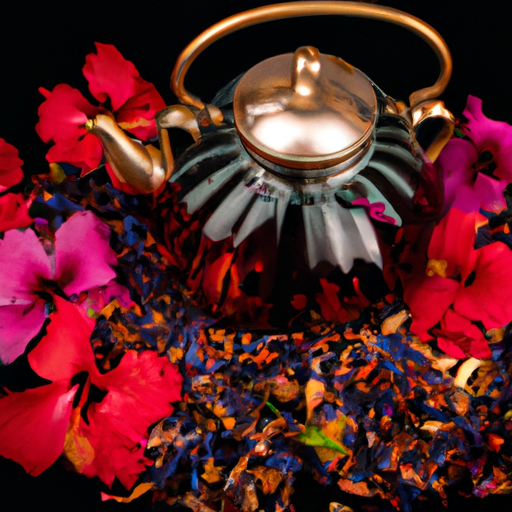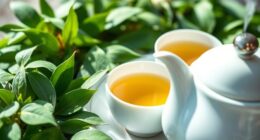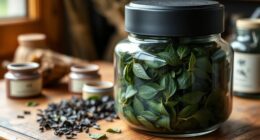Have you ever wondered how to harness the soothing power of passion flower in a cup of tea? Look no further! In this article, I will guide you through the process of drying passion flower leaves for tea, ensuring you can enjoy the benefits of this magnificent plant all year round.
Passion flower tea is renowned for its calming properties, making it a popular choice for those seeking relief from stress and anxiety. By learning how to harvest and dry passion flower leaves properly, you can preserve their potency and create a delightful cup of tea whenever you desire.
In this comprehensive guide, I will explain the benefits of passion flower tea, teach you how to harvest the leaves, and provide detailed instructions on various drying methods. From sun drying to air drying, I will cover all the necessary steps to ensure your passion flower leaves are preserved perfectly.
So, grab your gardening gloves and get ready to embark on a journey of tea-making mastery as we explore the fascinating world of drying passion flower leaves for tea.
Key Takeaways
- Choose vibrant and undamaged leaves in the morning for harvesting passion flower leaves
- Dry passion flower leaves in a cool, dark, and well-ventilated area
- Alternative drying methods include using a dehydrator, air drying, or oven drying
- Store dried passion flower leaves in an airtight container in a cool, dark place
The Benefits of Passion Flower Tea
Did you know that passion flower tea offers numerous benefits for both your mind and body? Passion flower tea has long been recognized for its ability to help reduce anxiety and promote a sense of calm. The active compounds in passion flower, such as flavonoids and alkaloids, have been shown to have anxiolytic effects on the central nervous system, helping to alleviate feelings of stress and anxiety. It acts as a natural sedative, promoting relaxation and aiding in getting a good night’s sleep. Passion flower tea can be a great alternative for those who prefer natural remedies over prescription medications.
Passion flower tea is also believed to have sleep-enhancing properties. It helps to improve sleep quality by increasing levels of gamma-aminobutyric acid (GABA) in the brain, which has a calming effect on the nervous system. This can be particularly beneficial for individuals who struggle with insomnia or have difficulty falling asleep.
In addition to its anxiety-reducing and sleep-enhancing properties, passion flower tea is also rich in antioxidants, which help to protect the body against oxidative stress and damage caused by free radicals. These antioxidants can support overall health and well-being.
Now that we’ve explored the benefits of passion flower tea, let’s move on to the next section and learn how to harvest passion flower leaves for tea.
How to Harvest Passion Flower Leaves
When you pluck the delicate treasures from their vine, you’re creating a symphony of nature’s harmony, ready to be transformed into a soothing potion for your soul. Harvesting passion flower leaves is a delicate process that requires careful techniques to ensure the freshness and quality of the leaves. To begin, choose leaves that are vibrant in color and free from any signs of damage or disease. Gently grasp the stem near the base of the leaf and use a sharp pair of scissors to snip it off. Be sure not to tug or pull the leaf, as this can damage the plant.
To preserve the freshness of the leaves, it is best to harvest them in the morning when the dew has dried but before the heat of the day sets in. This ensures that the leaves contain the highest concentration of beneficial compounds. After harvesting, place the leaves in a basket or tray, taking care not to overcrowd them. This allows for proper air circulation and prevents moisture buildup, which can lead to mold or rot.
Preparing the leaves for drying is the next step in the process of creating passion flower tea.
Preparing the Leaves for Drying
To unleash the full potential of these exquisite treasures, gently handle the vibrant green foliage and carefully ready them for their transformative journey. When it comes to drying passion flower leaves for tea, it’s essential to preserve their vibrant color. One tip for preserving the color of dried passion flower leaves is to avoid exposing them to excessive heat or direct sunlight during the drying process. Instead, opt for a cool, dark, and well-ventilated area. This will help retain the natural green hue of the leaves.
Another alternative method for drying passion flower leaves is to use a dehydrator. Set the dehydrator to a low temperature, around 95°F (35°C), and place the leaves in a single layer on the trays. This method allows for a controlled drying process, ensuring the leaves maintain their color and flavor.
When the leaves have reached the desired crispness, it’s time to move on to the next step: choosing the right drying method. By carefully considering the various options available, you can ensure the best results for your passion flower tea.
Choosing the Right Drying Method
For optimal results, you’ll want to consider which drying method best suits your needs and preferences. There are different methods of drying herbs, each with its own advantages and disadvantages.
One popular method is air drying, which involves hanging the passion flower leaves upside down in a well-ventilated area. This allows the leaves to dry naturally over a period of time, typically two to three weeks. Air drying is a simple and cost-effective method, but it does require patience and proper air circulation to prevent mold or mildew from forming.
Another option is using a dehydrator, which is a machine designed specifically for drying fruits, vegetables, and herbs. Dehydrators provide a controlled environment with low heat and airflow, allowing the leaves to dry quickly while retaining their color and flavor. This method is ideal for those who want to dry large quantities of passion flower leaves or have a shorter drying time.
Aside from tea, dried passion flower leaves can be used in various alternative ways. They can be added to potpourri or used as a natural ingredient in homemade beauty products, such as bath salts or herbal sachets.
Now that you have an understanding of different drying methods, let’s move on to the next section about drying passion flower leaves in the sun.
Drying Passion Flower Leaves in the Sun
Bask in the warmth of the sun and let its radiant rays gently coax the essence of the passion flower into a state of sublime preservation. Drying passion flower leaves in the sun is one of the most common and effective methods for preserving their nutrients. This traditional approach harnesses the power of the sun’s natural heat and airflow to slowly remove moisture from the leaves while preserving their beneficial compounds.
To begin, gather fresh passion flower leaves that are free from any damage or discoloration. Choose a sunny day with low humidity to ensure optimal drying conditions. Lay the leaves in a single layer on a clean, dry surface, such as a mesh screen or a baking sheet. Make sure to place them in a well-ventilated area, away from direct sunlight to avoid any potential damage.
Throughout the drying process, it’s important to periodically flip the leaves to ensure even drying. This will prevent any moisture from being trapped, which can lead to mold or spoilage. Depending on the weather conditions, it may take anywhere from a few days to several weeks for the leaves to fully dry.
Once the leaves are crisp and brittle to the touch, they’re ready to be stored for future use. Gently transfer them to an airtight container, such as a glass jar or a resealable bag, and store them in a cool, dark place to maintain their quality.
Now, let’s explore another method for drying passion flower leaves: using an oven.
Using an Oven to Dry Passion Flower Leaves
Now that we’ve explored the process of drying passion flower leaves in the sun, let’s dive into another method: using an oven. When it comes to drying herbs, an oven can be a convenient and effective tool.
To begin, gather your freshly harvested passion flower leaves and gently rinse them under cool water. Pat them dry with a clean towel, ensuring there’s no excess moisture.
Next, preheat your oven to a low temperature, around 150°F (65°C). Place the leaves on a baking sheet in a single layer, making sure they’re not overlapping. This will allow for even drying.
Once your oven is preheated, place the baking sheet with the leaves inside. Keep the oven door slightly ajar to allow moisture to escape. Leave the leaves to dry for about 2-3 hours, checking periodically to make sure they’re not burning or becoming too crisp.
Alternatively, if you have a dehydrator, you can use it to dry passion flower leaves as well. Simply follow the manufacturer’s instructions for herb drying.
Using an oven or a dehydrator are both efficient methods for drying passion flower leaves, especially if you need them to be ready quickly. However, if you prefer a more traditional approach, the next section will discuss air drying passion flower leaves.
Air Drying Passion Flower Leaves
To air dry your passion flower leaves, all you need is a well-ventilated space and a little patience. This method is ideal for those who prefer a more natural and traditional way of drying herbs. Air drying allows the leaves to gradually lose moisture, preserving their flavor and medicinal properties. Here’s how you can do it:
-
Start by harvesting your passion flower leaves. Choose healthy and mature leaves, preferably in the morning when the plant’s oils are at their peak.
-
Gently rinse the leaves to remove any dirt or debris. Pat them dry with a clean towel.
-
Lay the leaves in a single layer on a clean and dry surface. It could be a wire mesh or a wooden drying rack. Ensure that the leaves have enough space around them for air circulation.
-
Place the drying rack in a well-ventilated area away from direct sunlight. A warm and dry room is ideal. Avoid humid spaces as they can prolong the drying time.
-
Allow the leaves to air dry completely. This process can take anywhere from 1 to 2 weeks, depending on the humidity levels.
Air drying is a simple and effective way to preserve the potency of passion flower leaves for tea. If you’re looking for alternative methods, you can also use a food dehydrator or an oven at a low temperature. These methods can expedite the drying process, but may slightly alter the flavor profile. Once your passion flower leaves are dried, it’s time to move on to the next step: storing them for future use.
Storing Dried Passion Flower Leaves
After air drying, you can store your dried passion flower leaves in an airtight container to maintain their flavor and medicinal properties for future use. Storing dried passion flower leaves properly is crucial in preserving their potency and ensuring they stay fresh for longer periods.
It is important to choose a container that can be tightly sealed to prevent moisture and air from entering. Mason jars or glass containers with rubber seals are ideal for this purpose. Make sure to label the container with the date of drying to keep track of their freshness.
Store the container in a cool, dark place, such as a pantry or cupboard, away from direct sunlight and heat. Exposure to light and heat can degrade the quality of the dried leaves. Additionally, avoid storing them near strong-smelling substances as passion flower leaves easily absorb odors.
When you’re ready to use the dried passion flower leaves, simply measure out the desired amount and reseal the container promptly. This will help maintain the remaining leaves’ freshness.
Now that you have your well-preserved dried passion flower leaves, let’s move on to brewing the perfect cup of passion flower tea, which will further enhance its calming effects without any additional steps.
Brewing the Perfect Cup of Passion Flower Tea
Indulge yourself in the comforting warmth and soothing aroma of a perfectly brewed cup of passion flower tea, allowing its calming effects to wash over you.
Brewing the perfect cup of passion flower tea is a delicate process that requires attention to detail and the use of proper brewing techniques. To ensure the best flavor and maximum benefits, follow these steps:
-
Water temperature: Heat water to about 190°F (88°C). Boiling water can degrade the delicate compounds in the leaves, resulting in a bitter taste.
-
Steeping time: Steep the dried passion flower leaves in hot water for 5-7 minutes. This allows the leaves to release their beneficial compounds and flavors without becoming overly bitter.
-
Straining: After the recommended brewing time, strain the tea to remove the leaves. This will prevent the tea from becoming too strong or having a gritty texture.
By following these brewing techniques and recommended brewing time, you can enjoy a cup of passion flower tea that is both flavorful and therapeutic.
The next section will explore other uses for dried passion flower leaves, allowing you to further explore the benefits of this wonderful plant.
Other Uses for Dried Passion Flower Leaves
Unleash the versatility of dried passion flower leaves and let their potential blossom in various creative endeavors, like crafting unique herbal sachets or infusing them into homemade bath products. But the benefits of dried passion flower leaves extend beyond their aromatic qualities and aesthetic appeal.
These leaves possess remarkable medicinal properties that can be harnessed for various purposes. One popular use for dried passion flower leaves is in making passion flower oil. This oil is known for its calming and soothing effects, making it a great addition to massage oils or aromatherapy blends. To make passion flower oil, simply infuse dried passion flower leaves in a carrier oil, such as almond or jojoba oil, for several weeks. The resulting oil will contain the therapeutic compounds found in passion flower, such as flavonoids and alkaloids, which can help reduce anxiety and promote relaxation.
In addition to making passion flower oil, dried passion flower leaves can also be used in various other homemade remedies. For instance, they can be steeped in hot water to make a soothing tea that can help alleviate insomnia and promote restful sleep. They can also be added to bath salts or bath bombs to create a relaxing and fragrant bathing experience.
With their medicinal properties and versatility, dried passion flower leaves offer a world of possibilities for creative and therapeutic endeavors. Whether you’re making passion flower oil or exploring other uses, these leaves are sure to add a touch of natural beauty and tranquility to your creations.
Frequently Asked Questions
How long does it take for passion flower leaves to dry?
The drying time of passion flower leaves depends on the method used. The optimal drying method involves harvesting the leaves in the morning when the dew has dried. Next, gently wash and pat them dry.
Arrange the leaves in a single layer on a drying rack or a clean cloth in a well-ventilated area away from direct sunlight.
It typically takes about one to two weeks for the leaves to fully dry and become brittle.
Can I use a dehydrator to dry passion flower leaves?
Using a dehydrator to dry passion flower leaves is like capturing the essence of nature in a tiny machine. It’s a convenient and efficient way to preserve the delicate aroma and flavor of the leaves.
To ensure the best results, set the dehydrator to a low temperature, around 95°F (35°C), and spread the leaves evenly on the trays. This gentle drying process will help retain the beneficial compounds and create a fragrant tea that soothes the senses.
Are there any potential side effects or risks of consuming passion flower tea?
There are potential side effects and risks associated with consuming passion flower tea. It’s important to note that passion flower may interact with certain medications, such as sedatives and blood thinners. It’s recommended to consult with a healthcare professional before consuming passion flower tea if you’re taking any medications.
Additionally, it’s important to follow the recommended dosage for passion flower tea, as excessive consumption may lead to drowsiness, confusion, and digestive issues.
Can I mix passion flower leaves with other herbs or tea leaves?
Mixing passion flower leaves with other herbs can create unique and flavorful tea blends. Passion flower leaves have a distinct taste and aroma that blends well with herbs like chamomile, lavender, and lemon balm. These combinations can enhance the relaxing and soothing properties of passion flower tea.
Additionally, passion flower leaves can be used for other purposes besides tea. They can be infused in oils or made into tinctures for their potential calming and sleep-promoting effects.
How should I store dried passion flower leaves to maintain their freshness and potency?
To maintain the freshness and potency of dried passion flower leaves, proper storage is crucial. Remember the adage, ‘A stitch in time saves nine.’
After drying the leaves, ensure they’re completely cooled and free of moisture. Store them in an airtight container, preferably glass, in a cool, dark place. Avoid exposure to sunlight, heat, and humidity.
When stored correctly, dried passion flower leaves can retain their quality for up to one year, ensuring a delightful and effective tea experience.
Conclusion
In conclusion, drying passion flower leaves for tea is a simple and rewarding process. By carefully harvesting and preparing the leaves, then choosing the right drying method, you can preserve the beneficial properties of the passion flower.
Whether you opt for sun drying or air drying, storing the dried leaves properly ensures their freshness and potency. And when it comes to brewing the perfect cup of passion flower tea, following the recommended dosage and steeping time guarantees a delightful and soothing experience.
So why not explore the many uses of dried passion flower leaves and embark on a journey of relaxation and well-being?

